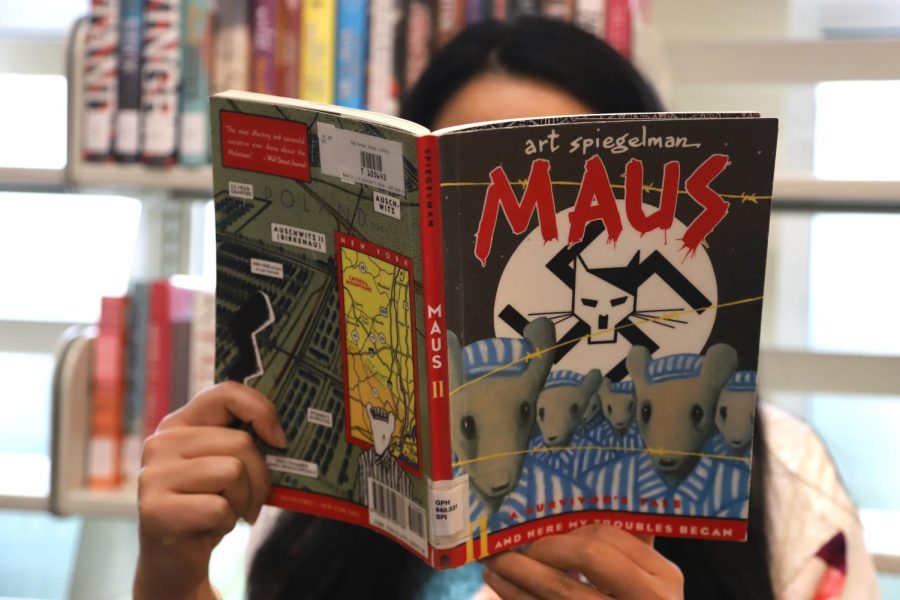‘Maus’: Banning what challenges you doesn’t change you
Recent Tennessee school district ban of graphic novel “Maus” hides the harsh truth of the Holocaust
Michelle Liu (12) reads “Maus,” a graphic novel by Art Spiegelman about the Holocaust. A Tennessee school board banned the book for eighth graders in January, a move that threatens to erase the real history of the Holocaust.
A Tennessee school district board unanimously voted to ban the Pulitzer-winning graphic novel “Maus” by Art Spiegelman, for its images and words that depict the Holocaust.
The Jan. 10 unanimous 10-0 vote in McMinn County, Tennessee, banned the book from the district’s eighth grade curriculum, with board members citing inappropriate language and drawings of a naked character. The graphic novel, with its first volume published in 1986 and second volume published in 1991, received a special Pulitzer Prize in 1992, the only graphic novel so far to do so.
This ban is wrong. It’s wrong because it erases the true reality of Holocaust history, glossing over horrific events to make them seem more agreeable to audiences. Spiegelman uses “Maus” to convey an honest portrayal of life during the Holocaust, not shying away from the gruesome truth.
In an interview with The New York Times on Jan. 27, International Holocaust Remembrance Day, Spiegelman revealed he was confused about the ban and believed that the school board wanted to “teach a nicer Holocaust.”
“This is disturbing imagery,” said Spiegelman in the interview. “But you know what? It’s disturbing history.”
With its depictions of Jews as mice and Nazis as cats, “Maus” conveys complex layers of meaning using the black-and-white illustrations of a graphic novel. Spiegelman characterizes each mouse as an individual, whether it be the author mouse, his mother or his father—while simultaneously depicting how they were perceived as a nameless mob slaughtered ruthlessly by the Nazi cats.
Using visceral drawings, Spiegelman brings life and reality to the experiences of his own family who went through the Holocaust. The novel takes the Holocaust beyond a horrifying list of statistics by depicting characters as three-dimensional individuals with feelings. It is crucial to continue Holocaust education in the United States. A study conducted by the Claims Conference found that 48% of U.S. Millennial and Generation Z could not name a single one of the more than 40,000 concentration camps or ghettos established during World War II. The Holocaust may seem like a far-off historical event to some readers, especially younger ones. “Maus” helps make it real.
In order to portray the Holocaust authentically, Spiegelman also does not shy away from the raw horror, profanity or nudity of it either. “Maus” is not easy to read. But by banning an ‘uncomfortable’ read like this one, the Holocaust is reduced to a simple sheet of statistics—just numbers, not accounts of real human beings.
Teaching the Holocaust in an easy-to-digest way might allow students to take a superficial glance at it. But in order to actually study the Holocaust, one has to learn about the horror of it. To truly be educated, and changed, by knowledge of the Holocaust, students must be thrown from the comfort of their own lives and forced to confront the true gravity of its cruelty. “Maus” has the rare ability to convey the experience in its true, humanized form — so it belongs in all places where young minds are on their journey to learn about the world.

Michelle Liu (12) is the co-editor-in-chief of The Winged Post. She joined the journalism program in her sophomore year as a reporter and became the Winged...

Sally Zhu (12) is the co-editor-in-chief of Harker Aquila, and this is her fourth year on staff. This year, Sally wishes to interview more people around...


















![“[Building nerf blasters] became this outlet of creativity for me that hasn't been matched by anything else. The process [of] making a build complete to your desire is such a painstakingly difficult process, but I've had to learn from [the skills needed from] soldering to proper painting. There's so many different options for everything, if you think about it, it exists. The best part is [that] if it doesn't exist, you can build it yourself," Ishaan Parate said.](https://harkeraquila.com/wp-content/uploads/2022/08/DSC_8149-900x604.jpg)




![“When I came into high school, I was ready to be a follower. But DECA was a game changer for me. It helped me overcome my fear of public speaking, and it's played such a major role in who I've become today. To be able to successfully lead a chapter of 150 students, an officer team and be one of the upperclassmen I once really admired is something I'm [really] proud of,” Anvitha Tummala ('21) said.](https://harkeraquila.com/wp-content/uploads/2021/07/Screen-Shot-2021-07-25-at-9.50.05-AM-900x594.png)







![“I think getting up in the morning and having a sense of purpose [is exciting]. I think without a certain amount of drive, life is kind of obsolete and mundane, and I think having that every single day is what makes each day unique and kind of makes life exciting,” Neymika Jain (12) said.](https://harkeraquila.com/wp-content/uploads/2017/06/Screen-Shot-2017-06-03-at-4.54.16-PM.png)








![“My slogan is ‘slow feet, don’t eat, and I’m hungry.’ You need to run fast to get where you are–you aren't going to get those championships if you aren't fast,” Angel Cervantes (12) said. “I want to do well in school on my tests and in track and win championships for my team. I live by that, [and] I can do that anywhere: in the classroom or on the field.”](https://harkeraquila.com/wp-content/uploads/2018/06/DSC5146-900x601.jpg)
![“[Volleyball has] taught me how to fall correctly, and another thing it taught is that you don’t have to be the best at something to be good at it. If you just hit the ball in a smart way, then it still scores points and you’re good at it. You could be a background player and still make a much bigger impact on the team than you would think,” Anya Gert (’20) said.](https://harkeraquila.com/wp-content/uploads/2020/06/AnnaGert_JinTuan_HoHPhotoEdited-600x900.jpeg)

![“I'm not nearly there yet, but [my confidence has] definitely been getting better since I was pretty shy and timid coming into Harker my freshman year. I know that there's a lot of people that are really confident in what they do, and I really admire them. Everyone's so driven and that has really pushed me to kind of try to find my own place in high school and be more confident,” Alyssa Huang (’20) said.](https://harkeraquila.com/wp-content/uploads/2020/06/AlyssaHuang_EmilyChen_HoHPhoto-900x749.jpeg)




